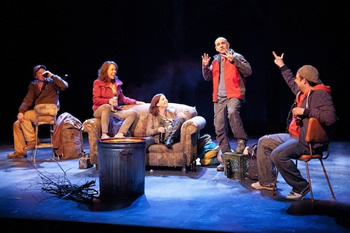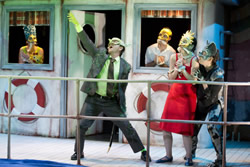
Doh! A Tragedy!
By Jonathan Kalb
Mr. Burns, A Post-Electric Play
By Anne Washburn
Playwrights Horizons
416 W. 42nd St.
Box office: (212) 279-4200
Mr. Burns, A Post-Electric Play is an extraordinary work about utterly ordinary people, and a tale of cheap sentimentality, easy nostalgia, gratuitous violence and pop-culture ingratiation that ultimately relies on none of those crutches for its startling dramatic effect. This is a wonderfully odd play—one of those insistently peculiar works that seems to form its own category even while borrowing flagrantly from others. Call it Histrionic Futurism. Or Domestic Apocalypse Drama. You’d see the problem if you saw the play, which you absolutely should because, labels aside, it’s the most perceptive and persuasive work about the necessity of theater to appear in many years.
The first of its three acts is set in the near future after an unspecified disaster has killed countless Americans and wiped out the electrical grid. But for the first ten minutes you think you’re looking at a backyard barbecue with friends sitting around a fire trying to remember the plot of the Cape Fear episode of The Simpsons. Slowly you begin to understand that this is a group of random, good-natured survivors, some armed, passing the time while alert to the dangers all around them. Those whose memories of particular lines in The Simpsons help move the conversation forward are building trust and camaraderie.
The second act is set seven years later when these people and others have formed a theater troupe—one of several that compete to provide survivors with entertainment. The troupe performs reconstructed episodes of The Simpsons, hit-song-mashup dance numbers, and TV ads elongated into mini-dramas whose purpose seems to be to tap nostalgia for the comfortable consumerist lives audiences have lost forever. In this world struggling to agree on new values, accurately remembered lines from Simpsons episodes are considered precious, valuable enough to be bought and sold like gold, silver or diamonds. After the media-meltdown, it seems, any fragments of shared culture are currency.
The third act, set seventy-five years later, consists entirely of a theater event, showing no social context outside the play at all. The show is a section of a mad, tragicomic musical in which masked Simpsons characters, crudely remembered now more as Grand Guignol freaks than as a happy cartoon family, speak transmuted shards of Simpsons dialogue, sing distorted and sometimes barely recognizable fragments of pop songs, and also speak and sing new material. The show is ridiculous and trenchant all at once: superficially flippant yet packed with real emotion, a satire about fear (drawn from the various iterations of Cape Fear, which no one living has seen) that feels also like an earnest meditation on fear. Self-consciously bizarre and yet vaguely familiar, the play-within-the-play clearly represents an effort to deploy theater as a cathartic tool to process and channel communal fears—just as in ancient tragedy. And improbably enough, The Simpsons, for these people, forms the core of their orally transmitted body of myth.

The resonance of this dramatic conception is huge, even though its execution is deliberately modest. Anne Washburn’s hazily outlined characters, her informal dialogue that often feels improvised, the prominence of random events in her plot: all of these feel like shrewd, focused choices rather than arbitrary stylistic preferences. And she had the right director to make them seem that way. Steve Cosson really understood the reason for the shagginess, as he molded a splendid cast (particularly Matthew Maher, Susannah Flood and Colleen Werthmann) into a delightful band of nondescript maladroits, never pushing them to be too polished as thespians. In the end, the play has something of the DIY, life-as-theater aura of performances by Elevator Repair Service, Nature Theater of Oklahoma, and Cosson’s own company The Civilians.
Washburn has made so many smart choices here. She never allows the dense irony of The Simpsons to color the play’s spirit, for instance, but rather sticks to an anomalous earnestness. The characters revere The Simpsons, not the author. Washburn also wisely keeps the play’s futurism simple, refusing to provide much detail about the background disaster. That’s why we’re able to focus on the larger subject, which is mankind’s psychic survival through artistic survival.
Mr. Burns is ultimately about reconstructing Kultur out of the detritus of pop-culture. So often in the past, serious drama has been snobbishly judgmental toward pop culture (think of Odets’ and Shepard’s victims of Hollywood, for instance). But in this particular apocalyptic scenario, that posture makes no sense, as pop culture is the default trove of inherited culture, period. (My son can quote long passages from The Simpsons but, alas, no Shakespeare.) Survivors in all places and times seek their demons and heroes where they can.
More than that, though, Washburn is also pointing out that survivors of our world would necessarily begin picking up the pieces with severe handicaps, because the information age has so atrophied our memory and creativity. The silver lining in her blasted post-media circumstance is that it offers the chance to regenerate those faculties. With a mangled and recycled oral culture, survivors grope and crawl their way back to a personally meaningful and invested relationship to myth.
Particularly touching to me is the way Mr. Burns unceremoniously celebrates theater as a basic human need. As is well known, the Simpsons writers have a penchant for things theatrical, periodically plunking impromptu stage gags and musical numbers into the show’s episodes, just for laughs. Part of the oddity of Mr. Burns is the way this sort of lighthearted gag-laughter grows half-serious and then fully serious as the fable moves on, suggesting that people are losing their taste for gratuitous irony and re-purposing the old jokes. They need theater again for the same reasons humans did in the past, to pass on hard-won wisdom about fearful suffering from generation to generation. The difference for them is that history has flipped their dramatic material on its trivialized head.
